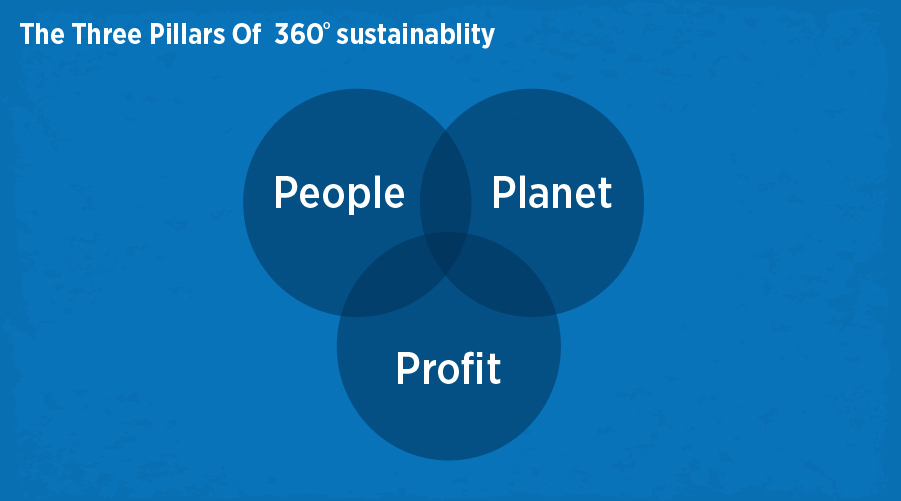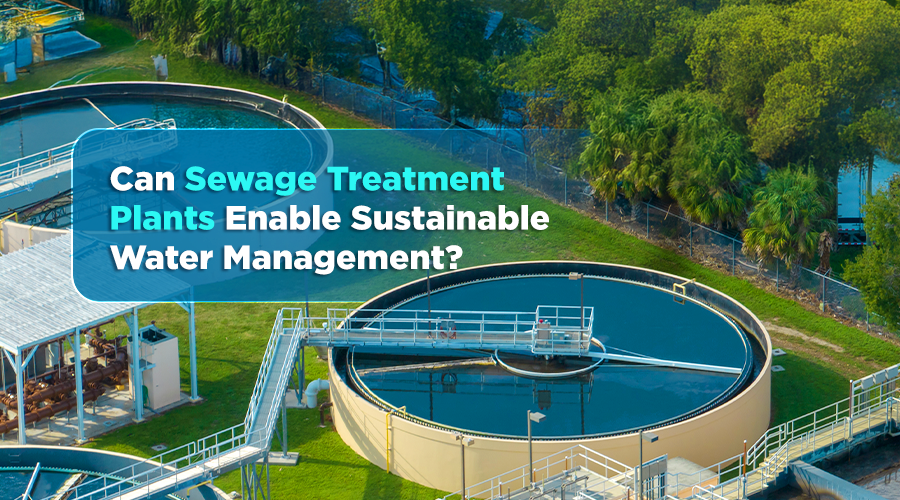Working towards sustainability has become an essential mission for the governments, corporates, and several other organisations almost everywhere. It is only with timely sustainable initiatives and practices that the environment can be saved from; biodiversity is protected, and our ecosystem is maintained at an optimum level. There is a dire need to embed sustainability into our everyday lives and activities whether personal or professional, to ensure that a healthy and prosperous environment is left for our future generations.
Within this context, what is necessary is to take a 360-degree approach towards sustainability. A sustainability approach just focusing on environmental issues will not yield desired results. While adopting environmental-friendly practices, one must also consider the economic and social aspects as a holistic approach.
Understanding 360° Sustainability:
Sustainability has always been broached from the environmental perspective; governments, corporates, and even the general public thought reducing pollution and conserving natural resources would be enough to ensure the successful resolution of all environmental issues. But in reality, the stakeholders ignored the impact of their activities and actions on the economic and social life perspective, thus solely focusing on the environmental issues. At this critical juncture, it was realised that a half-hearted approach to sustainability would not work. Therefore, the concept of 360-degree sustainability began to make the rounds.
Systematically and holistically approaching sustainability from all angles, from environmentally to economically and socially, will undoubtedly ensure that a sustainable society and environment are created for the present and future generations.
First Instance:
Let us take a 360-degree approach to sustainability in the field of restaurants and hotel management. A 360-degree sustainability approach would involve (but will not be limited to) utilizing organic and eco-friendly materials for the restaurant’s operations as a restaurant owner. Making use of organic ingredients, harvesting your kitchen garden while adopting composting and recycling strategies to reduce carbon footprint and developing community partnerships to uplift the area of work and ensuring transparent and accountable restaurant operations are some of the most influential and notable measures to keep in consideration.
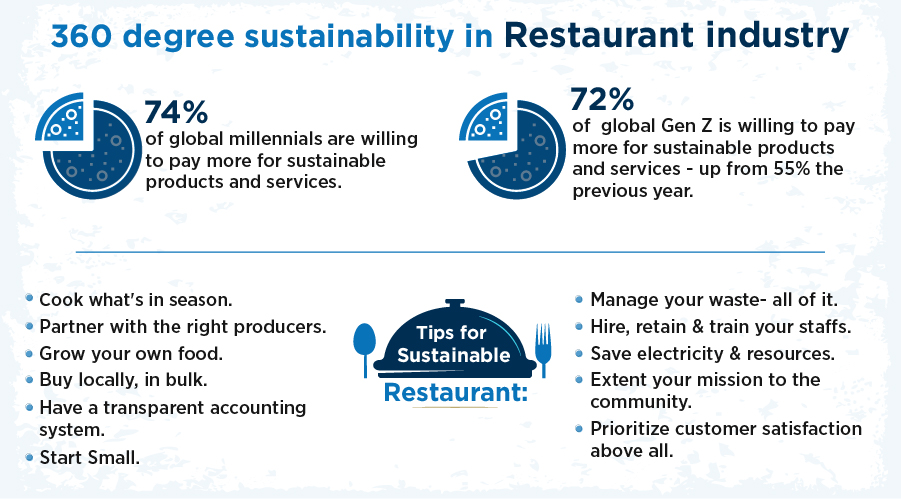
The image above shows how 360-degree sustainability can be achieved and benefits the restaurant industry.
Second Instance:
Similarly, a 360-degree sustainability strategy for a good consumer company would also be somewhat similar in the sense that they would sell organic and sustainable products; adopt recyclable packaging; even adopt sustainable supply chain management and manufacturing practices apart from working towards philanthropy and collaborating with NGOs and other companies to promote sustainability.
Many such instances can be given for this kind of fully integrated approach. Thus, it is evident that 360-degree sustainability is an amalgamation of the three pillars of sustainability i.e. environmental, economic and social, which are considered the backbone of our ecosystem.
An Insight into the Three Pillars of Sustainability:
360-degree sustainability includes practices and strategies to maintain the environmental balance, economic prosperity and quality of social life for all, corresponding to the three pillars of sustainability. This section will walk you through the three pillars one by one while also mentioning specific ways to incorporate each pillar in your daily lives. Remember, it is on all three posts that our ecosystem stands, and therefore all three need equal attention.
- Environmental Sustainability
In simple terms, this means living well within the limits of the environment and natural resources availability, thus not burdening our ecosystem any further. So here, the efforts are solely focused on protecting the environment and its resources through various strategies to maintain the optimal condition of the ecosystem. The sustainable use of natural resources ensures zero emission and no pollution; everything is associated with the environment.. Environment sustainability is all about maintaining the viability and health of Mother Earth, which is why it is also known as ‘Planet Pillar’.
Achieving Environmental Sustainability– To achieve this type of sustainability, one has to invest in and adopt new and greener technologies; adopt greener and healthier lifestyle practices like taking public transport, conserving water through rain water harvesting, using water judiciously, disposing of waste responsibly, recycling and reusing materials, reducing meat consumption, wearing sustainable clothes and fabrics and so on.
- Economic Sustainability
As we know, businesses and corporations work on the profit motive, which means they aim to enhance their economic prosperity and growth. However, corporations and companies need to realise that they can earn a profit because of the environment and society’s resources (natural and human). Keeping this in mind, it is their responsibility to give back to the environment and community by being economically sustainable. The idea behind economic sustainability is to ensure the economic growth of the corporate/business without harming either society or the environment.
Achieving Economic Sustainability- No size fits all companies and corporates when it comes to economically sustainable practices. It ultimately depends on the field of business and innovation and research they put in towards this end. However, certain things that can be done to achieve economic sustainability by all businesses which include conserving the use of energy; reducing the pollutants through proper waste disposal or treatment solutions; adopting ethical and fair trade practices; complying with the environmental standards at the national and international scenario; upholding human rights and contributing to the enhancement of quality of life in the society etc.
- Social Sustainability
The society we live in must provide us ample avenues for a healthy lifestyle and thus assure a high standard of living. It is precisely what social sustainability practices work towards sustainability and growth. It is only through social sustainability that the quality of life and social wellbeing of not only individuals but also various social organisations and the community of human beings, in general, can be ensured. Here, the practices and strategies that solely remain focused on targeting several challenges facing the world or the country like hunger, poverty, disease, gender inequality, etc.
Achieving Social Sustainability- Social sustainability can be achieved in the simplest of manner by ensuring good working conditions for your employees from providing goods, products and services that will help enhance the lives of the individuals to volunteering or donating in the non-profits that work towards reducing systemic inequalities in society; raising your voice against injustice in the society and so on.
Without the three pillars together, one can’t achieve a truly sustainable society. If only social and economic sustainability is focused on, then an equitable society is achieved. On the other hand, if only environmental and social sustainability is focused on, a sustainable society is achieved. If superior economic and ecological sustainability is achieved, then a viable community is completed. So, all three pillars of sustainability are essential (as shown in the Venn diagram).
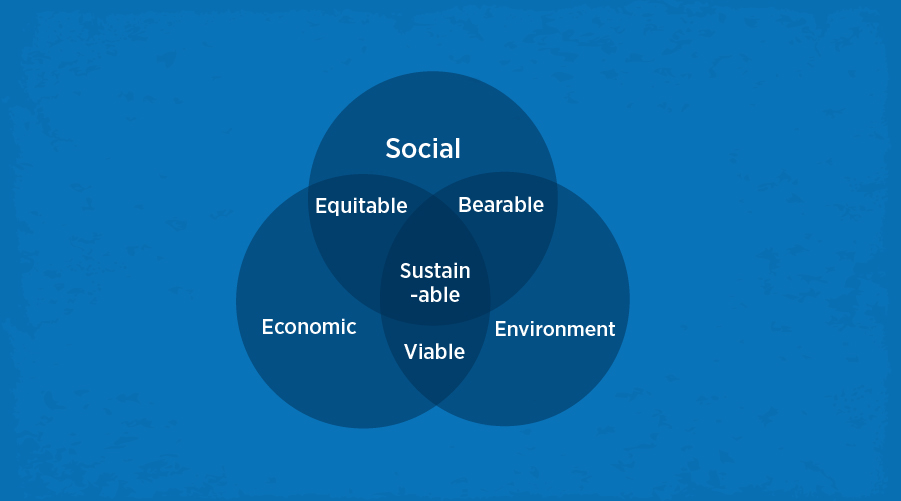
360° Sustainability- Success Stories
Corporates and businesses worldwide have understood that a 360-degree approach to sustainability is the only way to survive in the world today. Companies collaborate with various other companies to ensure that benefits are accrued to their respective companies, society, and the environment. Based on a survey, the image below shows the sustainable goals that the companies usually support, which is enough proof that businesses already realise the importance of sustainability in the modern-day world.
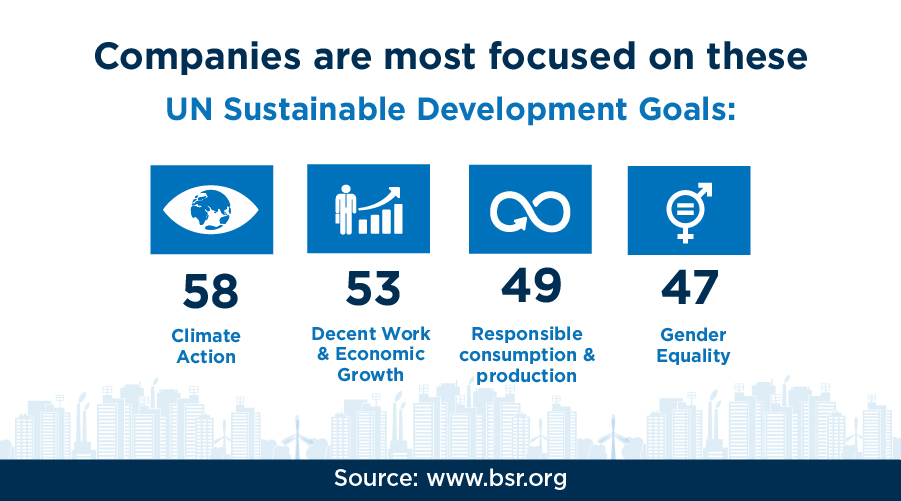
Some of the notable companies that have been working towards sustainability are as mentioned below:
- Salesforce: Salesforce is known for its sustainable campaigns & initiatives in the industry and they consider the environment to be their key stakeholder. They have already accomplished net-zero GHG emissions globally and focus on delivering a carbon neutral cloud. They also promote transparency in business by releasing annual stakeholder impact reports to be upfront about their sustainability achievements.
- Kraft Heinz: This firm is transforming as it is strategizing on making plant-based products.
- Diageo: Diageo came out with a paper-based and plastic-free bottle, and Unilever and PepsiCo have joined it to promote plastic-free packaging.
- CVS, Kroger, Target and Walmart have become associated with Beyond the Bag Initiative to help reduce the use of plastic bags through supporting and funding sustainable replacements.
- Disney: One of the largest brands, Disney has been following zero greenhouse emissions and zero waste policies. It also leverages technology to reduce its footprint and save water.
- HP: Hewlett Packard encourages green initiatives by spreading awareness through its ads, and it has a well-developed recycling program and plans to reduce emissions.
- Nike: Nike is known to have a successful range of sustainable products; it manufactures its products using renewable energy and also promotes sustainability through advertising.
- Apple: Recently Apple committed to bring 100% carbon neutral in their entire business including supply chain and product life cycle by 2030. Other initiatives include building a recycling robot to dismantle Apple tech to recover rare earth materials that can be reused in other devices
- Dell Technologies: Dell announced the goal of reducing their carbon footprints by 50% by 2030. They have also launched recycling programs and pledged to use more renewable energy resources in their properties.
- Target: With thousands of outlets globally , Target has made significant changes to reduce carbon emissions. Target supply chain locations have reduced the amount of waste that was sent to landfills by 75% through recycling programs & is also aiming to put solar panels on the roofs of 500 stores to improve their energy efficiency.
- Amazon: The company launched a Climate Pledge Fund worth $2 billion to invest in companies that build products, technologies & give services to “decarbonize” the earth. This initiative aims to help Amazon & partner companies reach net zero carbon by 2040, a part of The Climate Pledge. Other companies that are part of the pledge include Verizon and Infosys.
How To Follow 360-Degree Sustainability:
1- Think Twice Before You Shop: Every product & technology that is produced & created bears a certain amount of carbon footprint. ‘Reduce’, ‘ Reuse’, ‘Recycle’ are more than just buzzwords, so before you purchase anything, make sure you ask yourself- ‘Do I really need it?’ If yes, then purchase ethically sourced items with minimal packaging & shipping charges.
2- Go Plastic Free: Today, a billion tonnes of plastics are in circulation in the form of bags and other items that are hazardous for the planet’s biodiversity. You can start cutting down on plastics by using cloth bags, ditching plastic bottles & straws, etc.
3- Be Water Wise: Every drips & leaks cost 10,000 gallons of water loss in an average household, every year. It’s time we conserve water by fixing leaks, taking short showers, avoiding the purchase of bottled water, etc.
4- Drive Less & Ride Green: Imagine the amount of carbon reduction in the ecosystem that will occur when citizens change their commute. It’s time we switch to public transports, carpools & best of all bicycles to commute!
5- Green Your Area: Planting trees is an essential step towards sustainability. On an individual level, you can grow plants at home and grow your own garden. But you can take it a step further and encourage planting on a community level and promote Urban Forestry.
6- Green Your Plate: The meat industry is one of the largest contributors of GHG emissions & water pollution. It’s time we reduce meat consumption & add more greens to our plate.
7- Choose Renewable Energy: Eliminating fossil fuel habit is a crucial step towards changing wildlife and slowing down climate change. You can switch to the bountiful renewable energy sources like solar panels for home electric supply & electric vehicles.
8- Buy Local Products: One of the best ways to be sustainable is to shop from local stores and consume organic local food. Rather than buying exotic fruits that require shipping from a different country, why not consume seasonal local fruits and veggies? That way you will not just save money, but also encourage local businesses.
At Last But Certainly Not the Least:
As mentioned above, a 360-degree approach to sustainability gives each pillar of sustainability, viz. economic, social and environmental, equal importance to holistically tackle ecological degradation. And, no stone remains unturned to ensure that Mother Earth is protected from further harm and damage.
More and more companies have been going green in the current context and are also holistically ensuring that every part of their business operations ensures incorporating the three pillars of sustainability. It demonstrates the positive impacts that 360 degree sustainability based on economic, social and environmental perspectives can have on the environment and the different organizations, communities, and individuals. So we encourage you to begin small but work towards having a complete and integrated approach towards your sustainability initiatives and practices. It will certainly prove a towering initiative with a bigger impact.


